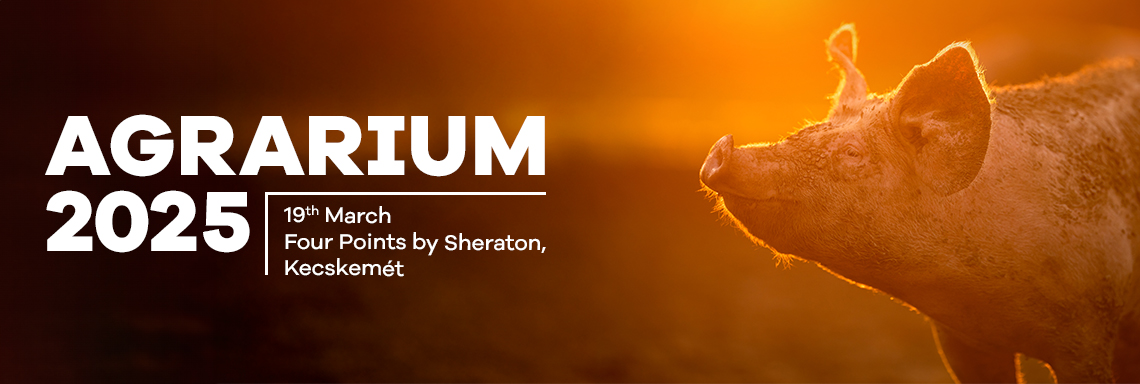



Are you a smallholder? Or have you started farming recently? You can now participate in the outstanding spring agricultural event, the Agrarium 2025 conference in Kecskemét on March 19th, with a 50% discount.
Please, fill out the following form, and Portfolio’s professional team will assess your claim so that you can redeem your discounted ticket.
If you have filled out the form, save it and send it to kistermeloikedvezmeny@portfolio.hu.
The subject of the letter: Portfolio Agrarium 2025 – smallholder application
You can access the form by clicking here.
This year, it remains crucial for domestic agricultural market players to receive their entitled agricultural subsidies promptly and efficiently. In recent years, the available resources for eligible recipients have steadily increased, and in 2025, it will be essential to ensure that the level of support remains stable and continues to grow. This session will present the expected changes in support for the year and the conditions that must be met to obtain funding in the new application period. There will also be a discussion on what kind of checks can be expected regarding the payments, and what farmer-friendly developments the Hungarian State Treasury is introducing. The experts will provide an overview of the anticipated changes in the EU's Common Agricultural Policy (CAP) regulations and discuss whether, in the long term, the CAP could be adjusted in ways that benefit domestic agricultural businesses.
What significant changes will come into effect this year regarding agricultural subsidies?
What should farmers prepare for in the new application period?
How will the available subsidy amount change in 2025?
What checks can industry participants expect when applying for subsidies?
What corrections might come into effect in the EU's Common Agricultural Policy regulations?
Could the EU CAP take a more favourable direction for domestic farmers in the long term?
08:30 - 08:35
08:35 - 08:55
Modernisation and development boom in agriculture – Agricultural economic subsidies in 2025
Speaker: Sándor Farkas, Deputy Minister, Ministry of Agriculture
08:55 - 09:15
Agricultural Insurance 2025: Solutions for Evolving Risks and Market Challenges
Speaker: Géza Sebestény, Agriculture Specialist, Hungarikum Biztosítási Alkusz Zrt.
09:15 - 10:00
Agricultural subsidies in 2025: key information and changes in the unified application process – New requirements of the EU Common Agricultural Policy
Moderator: László Hazafi, agriculture journalist, Portfolio/Agrárszektor
Conversation participants:
The producer protection law package, which came into effect this year, may offer new opportunities for farmers by establishing a new foundation for purchasing contracts. The session will review the benefits and obligations that the new regulation may bring to market participants, highlighting specific provisions related to non-payment sanctions, mandatory risk-sharing, contract grower cooperation, and occupational disqualifications. Another focal point will be a detailed overview of the financing opportunities available to agricultural businesses in 2025. There will be a discussion on expected macroeconomic shifts, sector-specific financing conditions, new loan products, and discounted loan programmes.
What advantages and obligations does the new producer protection legislation package include?
What are the specific regulations on non-payment sanctions, mandatory risk-sharing, contract grower cooperation, and occupational disqualification?
Which contracts are worth entering, and are new contract templates available?
How must buyers compensate producers, and what penalties can they face in case of legal violations?
What macroeconomic trajectory should agribusinesses expect in 2025?
How might financing conditions change in the agribusiness sector?
What new loan products are banks introducing to the market, and what discounted loan programmes can agribusiness players take advantage of?
10:20 - 11:05
A new legislation package regulates the business relationships between agricultural producers and buyers: how to enter into contracts in 2025? – Special provisions and sanctions
Moderator: László Hazafi, agriculture journalist, Portfolio/Agrárszektor
Conversation participants:
11:05 - 11:20
Changing Environment, Changing Financing in Agriculture – "Everything Changes, but the Essence Remains!"
Speaker: István Szabó, Executive Director, OTP Bank Corporate and Agricultural Directorate
11:30 - 12:20
Crucial financing opportunities and solutions in agribusiness – New loan products, discounted loan programmes, financing conditions
Moderator: Zoltán Bán, CEO, Net Média (Portfolio Group)
Conversation participants:
What can farmers expect after this year's grain harvest, and what are the key factors that could influence price trends and sales opportunities? This session will provide answers by reviewing the most significant global market processes impacting the grain sector, the effects of the situation in Ukraine on the Hungarian market, and issues related to crop quality. Experts will analyse how the cost structures of major arable crops might evolve this year, what producers should pay particular attention to during the growing cycle, and what profitability they can expect after the sale of their harvests.
What could be the most important factors affecting the cereals market this year?
What cereal prices can farmers expect in 2025?
How could the situation in Ukraine influence the regional grain market, including Hungary?
How could the cost structure of the main field crops evolve this year?
What profitability can field crop producers expect in this year’s farming cycle?
13:20 - 13:35
Folyékony arany: precíziós öntözési és tápoldatozási rendszerek
Speaker: Krisztián Molnár, Agricultural Engineer, Poliext Kft.
13:35 - 14:35
Expected price trends and sales opportunities in the grain market – Profitability prospects for crop production in 2025
Conversation participants:
The session summarises the key trends in the domestic food market, providing an overview of the market and sales opportunities available to food industry companies this year. The roundtable discussion will cover topics such as relationships between food retailers and suppliers within the industry, as well as new products and technologies in modern and sustainable food packaging and the regulatory environment surrounding them. Additionally, the session will explore the domestic and international community marketing programmes food industry businesses can join this year to support their market appearances.
What demand and consumption trends are expected to characterise the domestic food market this year?
What new competitiveness-enhancing development programmes might open up for industry players?
How might regulations and costs related to food packaging change?
What are the latest products and technological solutions in modern and sustainable food packaging?
What are the new directions for accessing foreign markets and effective development opportunities?
What domestic and international community marketing programmes are available to food industry businesses?
13:35 - 13:50
SSI SCHÄFER’s Innovative Technologies and Software – Intralogistics Solutions Designed for the Agricultural Sector
Speaker: Péter Kardos, CEO, SSI Schäfer Systems International Kft.
13:50 - 14:35
The key changes in the domestic food market – The latest trends in sustainable food packaging and community agribusiness marketing programmes for domestic and international markets
Conversation participants:
Last year, livestock farming businesses performed better than in previous years, and it is vital that this positive trend continues in the coming year. The session provides a detailed analysis of expected cost changes, purchase prices, and profitability forecasts in key livestock sectors, while also reviewing the animal health challenges affecting the livestock industry. Additionally, experts will present the expected changes in the feed market in 2025, as well as the new feeding technologies that can make livestock farming operations more efficient.
What are the most important changes that will affect the costs of livestock farming operations?
How may purchase prices develop this year in the key livestock sectors?
Can the profitability of livestock farming businesses continue to improve in 2025?
What are the most significant animal health challenges in the livestock sector this year?
What changes are expected in the feed market, and what are the main factors that could determine feed prices?
What feeding technologies can livestock businesses implement to enhance their operational efficiency?
15:10 - 15:20
In the Shadow of Great Power Games – The Impact of This Year’s Feed Prices on Livestock Farming
Speaker: Zoltán Kulik, CEO, Vitafort Zrt.
15:20 - 15:30
More Economical, More Marketable, More Profitable – The Future of Soybean in Hungary
Speaker: Zoltán Bene, Manager, Karintia Kft.
15:30 - 16:15
Trends and Effective Solutions in Feed and Animal Husbandry – Animal Health Crisis Due to the Emergence of Foot-and-Mouth Disease Virus
Conversation participants:
Farmers must optimise their use of inputs – plant protection products, fertilisers, and seeds – and manage input costs due to the profitability challenges in arable crop production. The session will review the key factors influencing this year's input material market and outline the expected price trends and supply-demand dynamics that producers can anticipate. The discussion also covers how farmers can reduce their input costs in a reasonable manner that meets agrotechnical requirements, as well as the new products and technologies that can help protect their crops more sustainably and in an environmentally friendly way while ensuring their optimal nutrient needs.
What factors will determine the agricultural input market conditions in 2025?
What fertiliser, seed, and pesticide prices to expect?
How can agricultural producers optimise their input costs?
How can fertilisation, seed selection, and pest control be adapted to changing climatic conditions?
What are the new products and technologies that can make input material management more sustainable?
15:15 - 16:15
What to expect from agricultural input markets – Price forecasts, new products and technologies in fertilisation, plant protection, and seed usage
Conversation participants:
How can domestic agribusinesses successfully participate in the numerous agricultural and rural development tenders that have emerged recently? This will be the main focus of the session, in which experts will provide a detailed evaluation of the application conditions and performance criteria. They will cover the evaluation criteria of the applications submitted so far, the smoothest possible implementation opportunities, as well as the payment schedule for the subsidies and the inspection criteria. In addition, the session will present which further calls for applications are expected in 2025 and how agricultural sector participants can apply for them.
What is the timeline for evaluating submitted agricultural and rural development applications, and when can applicants expect to receive grant award documents?
What are the most important practical aspects and experiences regarding the implementation of the projects?
When are the grant payments expected for the winning projects?
What criteria are used to monitor the implementation of the projects?
What new agricultural and rural development grants can be expected in 2025?
16:15 - 16:30
The criteria for successful agricultural and rural development applications – New calls for proposals in 2025
Speaker: Szabolcs Szigeti, Deputy State Secretary, Ministry of Agriculture
16:30 - 17:10
The evaluation, implementation, monitoring, and payment criteria of agricultural and rural development applications – Requirements for successful applications, new calls for proposals in 2025
Conversation participants:
After last year's significant decline in the agricultural machinery market, support measures that encourage digital transition and the spread of precision farming in domestic agriculture could be crucial. The session will delve into the conditions for modern and efficiency-boosting developments offered by new grant opportunities expected this year, the application criteria, and the funding amounts that agricultural businesses can access for various purposes. The discussion takes a close look at the likely machinery market trends for this year, as well as the latest technical and technological products and developments.
When will grants encouraging digital transition and precision farming be available?
What are the conditions for applying for specific purposes?
What amount of funding can farmers receive for digital and precision developments?
What can be expected in the domestic machinery market this year after last year's significant decline?
What are the latest technological and technical developments in agricultural machinery available in our country?
16:15 - 16:30
Digitális és precíziós fejlesztések a mezőgazdaságban - Új pályázati források a gazdálkodók számára
Speaker: Anikó Juhász, Deputy State Secretary, Ministry of Agriculture
16:30 - 17:10
New funding opportunities for digital transition and precision farming in agriculture – Development directions, application conditions, technical and technological solutions
Conversation participants:
Be our guest for a glass of champagne after the programme, and don't miss the networking opportunity with conference participants and speakers!
This is how Agrárium 2024 roared – join us this year too!
Super Gold Sponsor
Main professional partner
Gold Sponsor
Silver Sponsor
Silver/Expert Sponsor
Bronze Sponsor
Official car rental partner
In association with
Main Media Partner
Media Partner
Organisation, general questions

Sponsorship


Program
